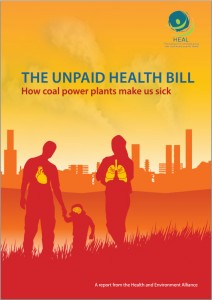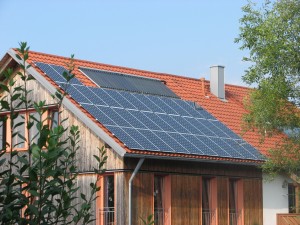Welcome to Coaland
Originally posted earlier this summer at youthpolicy.org, a global evidence-base for youth policy.
Poland is responsible for only about 1% of global greenhouse emissions. But the carbon dioxide emissions per capita are over the European Union (EU) average and the country is also one of its least efficient economies. More than 90% of electricity is produced from coal which makes Poland one of the top ten consumers of it worldwide and the second largest in the EU, directly after Germany.
 Two thirds of the coal-fired power plants are older than 30 years and more than one third are older than 40 years. The power station in Bełchatów is the second largest lignite plant in the world and the biggest single polluter in the EU. According to Greenpeace’s new report called ‘Coal kills. The analysis of health costs of emissions of the Polish energy sector’ the coal power plants are responsible for almost 5400 deaths a year, about 1000 of them are related to Bełchatów. The recently published analysis ‘The unpaid bill. How coal power plants make us sick’ of the Health and Environment Alliance (HEAL) says that Poland’s total health costs from coal power generation are the highest in the EU – it is an equivalent to approximately about 30% of average annual amount of EU cohesion funding to the country.
Two thirds of the coal-fired power plants are older than 30 years and more than one third are older than 40 years. The power station in Bełchatów is the second largest lignite plant in the world and the biggest single polluter in the EU. According to Greenpeace’s new report called ‘Coal kills. The analysis of health costs of emissions of the Polish energy sector’ the coal power plants are responsible for almost 5400 deaths a year, about 1000 of them are related to Bełchatów. The recently published analysis ‘The unpaid bill. How coal power plants make us sick’ of the Health and Environment Alliance (HEAL) says that Poland’s total health costs from coal power generation are the highest in the EU – it is an equivalent to approximately about 30% of average annual amount of EU cohesion funding to the country.
What is the government’s answer? Lately, Prime Minister Donald Tusk said that Poland – despite the concerns mentioned above – will increase its use of coal because it is in large supply and thus could reduce dependence on imports. So parallel to preparing to host COP19 the government is planning the construction of several new coal power plants and mines, most of them will start working after 2020. One of the biggest investments is Elektrownia Północ (North Power Plant), the carbon emissions of which will be equivalent to increasing the country’s population of 1.8 million inhabitants. These plans will prevent the energy sector’s decarbonisation for several decades. At the same time, Poland’s former chief geologist and former Vice-Minister of Environment Michał Wilczyński forecasts that the country’s brown coal deposits will run out by 2035 and the mining of bituminous coal is going to be so expensive that around 2030 Poland will import more of it than produce.
 Defending its addiction to coal the government is using two sorts of arguments – protection of the national economy and sovereignty. Both of them are highly questionable. The costs connected with mining are already increasing. As journalists Bartłomiej Derski and Rafał Zasuń wrote on July 4th: „All Polish coal mined last year was worth about 30 billion PLN. In the same time we paid 8 billion PLN for the miners’ pensions. By comparison, according to the Prime Minister, very expensive renewable energy received subventions of approximately 2.4 billion PLN (without co-firing biomass with coal). According to Greenpeace’s report ‘Working for the climate’, the implementation of an ambitious program of ‘greening’ the energy sector could create over 170,000 net jobs (taking into account the reduction in employment in sectors such as mining). And what about the second argument? Already last year, every fifth tonne of bituminous coal was imported, even from United States. For many years Poland has been importing twice as much coal as exporting.
Defending its addiction to coal the government is using two sorts of arguments – protection of the national economy and sovereignty. Both of them are highly questionable. The costs connected with mining are already increasing. As journalists Bartłomiej Derski and Rafał Zasuń wrote on July 4th: „All Polish coal mined last year was worth about 30 billion PLN. In the same time we paid 8 billion PLN for the miners’ pensions. By comparison, according to the Prime Minister, very expensive renewable energy received subventions of approximately 2.4 billion PLN (without co-firing biomass with coal). According to Greenpeace’s report ‘Working for the climate’, the implementation of an ambitious program of ‘greening’ the energy sector could create over 170,000 net jobs (taking into account the reduction in employment in sectors such as mining). And what about the second argument? Already last year, every fifth tonne of bituminous coal was imported, even from United States. For many years Poland has been importing twice as much coal as exporting.
 At the end of June, Tusk said that the agreement to the EU energy and climate package in 2008 was a ‘dramatic and dangerous mistake’. ‘We won’t allow ourselves to be misled by the big industry lobby, as our predecessors were, we will not put into the heads of Polish people that solar panels and wind turbines are the energy future of Poland’ – he added. At the same time the experts (from the ‘big industry lobby’?) are proving that renewable energies could cover 26% of electricity demand in 2020 and even 80% in 2050. Meanwhile the European Commission announced in March that Poland is being referred to the Court of Justice for failing to adopt EU rules regarding implementation of Renewable Energy Directive. The deadline was three years ago. The consequence can be a fine of over 133,000 euros per day until the Directive will be fully implemented.
At the end of June, Tusk said that the agreement to the EU energy and climate package in 2008 was a ‘dramatic and dangerous mistake’. ‘We won’t allow ourselves to be misled by the big industry lobby, as our predecessors were, we will not put into the heads of Polish people that solar panels and wind turbines are the energy future of Poland’ – he added. At the same time the experts (from the ‘big industry lobby’?) are proving that renewable energies could cover 26% of electricity demand in 2020 and even 80% in 2050. Meanwhile the European Commission announced in March that Poland is being referred to the Court of Justice for failing to adopt EU rules regarding implementation of Renewable Energy Directive. The deadline was three years ago. The consequence can be a fine of over 133,000 euros per day until the Directive will be fully implemented.
This national strategy of the government has its consequences in the international policy. Poland is seen as a real barrier to progress in the EU which in turn holds up progress at the wider level. Samantha Smith from WWF laid it out brilliantly: ‘The top three factors that have held the EU back in terms of politics are Poland, Poland and Poland’. No wonder that the fact that Warsaw will host the next COP keeps many awake at night.
You probably ask yourself why Polish citizens are not present in the discourse. You will wonder reading the opinion polls. According to them, the majority of Polish people (84%) think that climate change is a big threat and there is a need to act now. Three quarters (75%) have the opinion that the EU should be a global leader in climate protection. Almost everybody (96%) believes that we should to use more clean energy. More than two thirds (67%) declare that they could pay more for it and 69% that we have to fight against climate change even if it should stop the economic growth. Unfortunately, at the same time the approach of Polish people to climate protection is very institutional – the overwhelming majority believes that the action against climate change should be taken by the government (67,5%), while only 32,9% see it as a citizens’ task.
 On the other hand something seems to have changed since 2009 when the opinion polls were taken. There are new protest movements against the government’s environmental policy. Occupy Chevron Żurawlów, resistance against the construction of the Elektrownia Północ power plant, and the quickly growing Polish Youth Climate Network are only three out of many examples. One of the biggest strengths of these movements is their diversity – people of all kinds of social backgrounds are starting to fight for the right to self-determination and to live in a healthy, safe, and sustainable environment. However, this is just the beginning of a long struggle, the opponents are very powerful, and time is short.
On the other hand something seems to have changed since 2009 when the opinion polls were taken. There are new protest movements against the government’s environmental policy. Occupy Chevron Żurawlów, resistance against the construction of the Elektrownia Północ power plant, and the quickly growing Polish Youth Climate Network are only three out of many examples. One of the biggest strengths of these movements is their diversity – people of all kinds of social backgrounds are starting to fight for the right to self-determination and to live in a healthy, safe, and sustainable environment. However, this is just the beginning of a long struggle, the opponents are very powerful, and time is short.
Photo Credit: On-eco Polska via Flickr, Platforma Obywatelska RP via Flickr, Occupy Chevron




-
zeFrog
-
http://www.joshuawiese.com Joshua Wiese
-
Michalina Golinczak
About the author
Michalina Golinczak
alterglobalistka, redaktorka pisma „Recykling Idei” (recyklingidei.pl) i bloga Ale Klimat! (aleklimat.pl)
- Tweety na temat @mgolinczak





